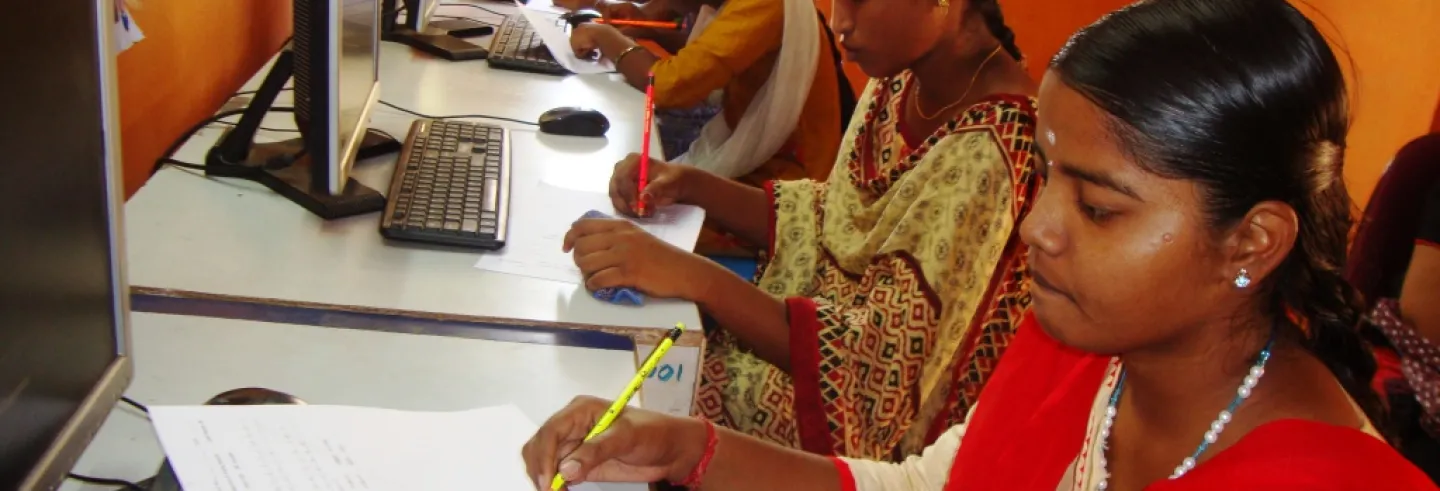The statement of the IBM chief, Ginni Rommetty that there is no lack of jobs but there is a lack of skilled manpower in India was widely circulated. Lack of skills, she said, was the reason why fresh engineering graduates were not hired or paid well. (PTI Mumbai, 2019) This statement served twin purposes it absolved the market of responsibility for its arbitrary hiring, wage-determining and firing practices. It also erased the subject of skilling from questions of social trauma and identity.
We are all blank slates on which the market can assign a value based on our performance in a hierarchical skill pyramid and deemed either fit or unfit labour.
What Rommetty and many others forget is that what is considered as skill in a society is in itself a value judgement. When we term somebody as unskilled, we deploy a social construction of productivity and deficiency. (Otis & Wu, 2018) The social construction of ‘skill’ plays a very important role in demarcating the workforce, and is used as a legitimate means to produce inequalities in the workplace. This demarcation, in turn, reproduces existing hierarchies in society on the lines of gender, caste, race and class. In fact, the word ‘skill’ comes for the Norse term ‘skilja’ which means “discernment, the ability to make distinctions and divide”(Otis & Wu, 2018). We need to consider these political and socio-economic dimensions while ‘skilling the last first’.
The story of Musiri
Let us take a step back see what skilling means to people in Musiri (population 28,727 in Census 2011), a town panchayat in Tiruchirappalli district of Tamil Nadu.
I met a group of 20 teenagers in the town who were seeking the help of a private training provider for improving their typing skills, free of cost. According to data collected in a survey conducted by D. Sumathi of the training institute, 16 of them belonged to the Scheduled Castes and all their families had an annual income of less than Rs 1 lakh. These children had done their schooling at the most up to the 8th or 9th standard of schooling. They dropped out of school because circumstances in the family were not conducive to further education.
One of them, Vadivelu, stopped going to the nearby government school because he felt his teachers and classmates were constantly ridiculing him because he was not good at academics. He finally dropped out altogether because, he said, the teacher beat him very frequently without any reason.
Vadivelu is a great cook, remarks the skill centre coordinator. He cuts 1 kg of onions with ease and then fries them with chicken – his food preparations are such a treat to them. Vadivelu is quick to interrupt the co-ordinator. Visibly embarrassed, he tells me that he cooks only when he feels like it. Later, during the interview Vadivelu says that he regrets dropping out of school, as he feels that nobody now respects him. He says that he would be considered valuable only if he learns how to type on a computer.
[O]nly two of the trainees had access to a computer at home and practice what they learnt in the centre.
I observed the trainees as they filled out their assessment sheets – they had to type the English alphabets from A to Z in MS Word. Some of them struggled to find the application in their computer. I would later learn that only two of the trainees had access to a computer at home and practice what they learnt in the centre. Most of them struggle to find the “Enter” key to insert a line break and start again on the next line with the letters typed backwards. But not all of them find it difficult! Satyaprakash hesitantly shared with me later that the test was very easy for him and that he would love to do well in an advanced course.
A couple of seats are vacant during the final batch of assessment. Saraswathi and Vasanth take them and are glued to their seats. On a closer look, Saraswathi is playing “Purble Palace” in which one must bake customised virtual cakes and Vasanth is designing a greeting card styled with hearts and arrows in MS Paint. A group of young men are hanging out outside -- sitting on their parked cycles and motorbikes, and peering through the windows of the test centre whenever their conversation gets dull. Some teachers and kindergarten children from the nearby government school are chatting in the verandah outside. The centre for the community has become much bigger thana training centre. It is a place to congregate and have a little fun, an organic space for learning and also to meet friends.
The trainer in the skill centre is an engineering graduate from Trichy. He earns about Rs. 7,500 per month for finding suitable candidates and teaching them some basic skills. While he is only supposed to teach them basic computer skills, he says that he has to put in considerable effort because most of the trainees do not even know the English alphabets properly. He says that he has to ‘start from ABC’. With sustained effort he says that he is able to improve the typing skills of those who attend the coaching class regularly. He pauses and then admits that he worries for them. Their typing speed is still not good.
While a few students like Vadivelu hope to try their luck again with the school system and hope that they are integrated into it this time around, others only bank on using the training certificate to help them secure a job. Most of them do not exactly know the kind of job they would want after completing their course. To them, their chances of finding a job, just any job, will improve after the programme. For Vikraman, this is just a temporary break from farming work. As the only son in a female-headed household, he has to do his bit by irrigating the fields. He has always been fascinated by computers and has decided to attend the course in his spare time.
Government intervention in skilling
Rommetty while explaining low wages among entry-level engineers remarked that ‘You have got to believe in a few different things than I think you believed in the past. One is to believe that skills are perhaps more important than a degree.’
However, it is often forgotten, that the value attributed to a particular skill reproduces the extant class, racial, gender, caste-based divisions in the society. This value to a skill is constructed in a society that is not free from biases. These biases inform Vadivelu’s self-perception of a lack of worth in society and his ambitions to type well in order to be respected, but also his perception that cooking is not a skill but a possible source of embarrassment.
Jensen (1991) notes that feminine work is often attributed to the so-called innate abilities and aptitudes of a woman, and not to possessing a skill. The government skill training programmes should recognise that their targets are very often those who lack most the forms of social and human capital that enable a successful career trajectory in a formal occupational system. Their skilling then needs extra care and intervention in addition to the regular ‘educating’ processes. The Government needs to take corrective action that reconstructs the perceptions of (and therefore, the premiums afforded to) skills and tasks, historically assigned to be performed by the marginalised. However, we often see the reverse. A recent, very powerful story on the cooks of the mid-day meal programme found that these women were paid extremely low honorarium for working about seven to eight hours in a day. Dixit ( 2019) concludes that “such an abysmal gender pay gap in the framing of the mid-day meal policy finds its roots in the patriarchal assumption that female labour is disposable”.
The NDA Government launched the Skill India campaign in July in 2015. The Pradhan Mandri Kaushal Vikas Yojana (PMKVY) is the large flagship programme of the Ministry of Skill Development and Entrepreneurship (MoSDE), absorbing a lot of government money. Apart from the over-emphasis on short-term training (STT) programmes, it has a component called Recognition of Prior Learning (RPL).
The RPL is a powerful idea that seeks to recognise the value of skills informally learnt by the vast number of informal workers in the country and to afford a suitable remuneration for their skills. In theory, it could help a whole range of workers in the unorganised sector, consisting mainly of women and the marginalised castes, to gain a more secure position in the workplace. In practice, however, it is used as a low-hanging fruit by training providers and policy practitioners to showcase increased numbers of successes of government intervention in skilling. For instance, RPL projects marketed as job creators often tap the social fact that most women are eligible to be RPL certified with tailoring and cooking skills. The ‘numbers game’ approach to skilling (actively adopted in many STT and RPL projects) shows the blatant disregard for the historical injustice done to women, for instance, in terms of carrying an unfair share of the domestic workload.
Policy-makers and private companies only perceive the skill ecosystem in the country as a machinery that continuously produces a large workforce that has been trained, certified and assessed in the most mechanical fashion.
I contend that any RPL or STT certification that is not accompanied by a considerable increase in the employability and bargaining power of the worker disregards the time and effort put in by the trainee. This unfortunately seems to be the case of almost half 1 As per the official PMKVY website, as on March (2019) 20,74,446 candidates had passed the short-term training courses and were eligible for employment. The corresponding placement number stands at 10,91,558. of the short-term training carried out. Vadivelu did not identify himself as a child labourer, but he had been in the informal workforce for the last couple of years whenever in financial need. Any skill training programme that does not result in a substantial improvement in the bargaining power of the worker needs to be evaluated and if the performance is poor, then the training curriculum must be revised.
The National Skills Qualification Framework (NSQF) was introduced by the Government to organise training according to levels of knowledge, skills and aptitude. It is a welcome step designed to align all training courses to a standardised national framework. It is also aimed to enable workers to align themselves with international skilling frameworks and to further upskill themselves through vertical integration.
For example, a training programme to equip someone to become a ‘retail store ops assistant’ is designed by the MoSDE and the retail skill sector council. The outcomes of the programme mandate that the trainee possesses a number of skills including in writing reports and interpreting datasheets.(Ministry of Skill Development & Entrepreneurship, 2015) Divyashree, from Musiri, too aspires to become a retail store assistant, but her outcome from the one-month training was that she finally learnt to write her name. There is a vast amount of ‘catching up’ that the students who failed in the (and by the) education system need to accomplish in the skill ecosystem. There is an organic component to learning, which is something that the NSQF could take into account.
This leads me to my argument of the need to rethink the pedagogy of skilling in our country. Policy-makers and private companies only perceive the skill ecosystem in the country as a machinery that continuously produces a large workforce that has been trained, certified and assessed in the most mechanical fashion. The language of employment reports suggests that if this assembly line of learning is left untouched, the returns on our GDP will be many folds. The logic and language employed forget that skilling is ultimately a learning process. As Friere notes in The Pedagogy of the Oppressed, education should stop from being an ‘act of depositing’ information. Rather than trying to ‘integrate’ the unskilled into the mainstream workforce, a ‘humanist educator’ would adopt a dialogical approach to learn from and integrate the life experiences of the students into the learning process.
Finally, the Government and the market need to take active and concrete steps to correct our biases in hiring, wage-setting and performance evaluations. It is now well understood in the West that ‘culture fit’ goes against hiring for diversity in the workplace. (Schmidt, 2017). Still, not many organisations recognise that the less privileged often struggle to be on the same footing as the privileged recruits in communication and negotiation processes in the workplace, processes that are crucial for building social capital and overall well-being. Whether Indian firms actively deliberate these dilemmas is something we do not yet know. These discussions could be stimulated through active campaigns or more subtle behavioural nudges in government communication, but also be backed by active labour legislation and guidelines. Finally, government bodies should disclose data that is used for evaluating and monitoring processes in skill development.
The social construction of skill
When we use terms such as “unskilled” or “semi-skilled” to describe a person, we are making a value judgement based on what the market discerns as valuable. Like all social constructions, this is not frozen in time but subject to change. Like Chambers (2014) points out in “Putting the Last First” (from which this article’s title has been borrowed), we need to be aware that the stereotypes and blatant generalisations that these terms perpetuate is indeed a renewed market-based form of Social Darwinism.
...[The skill eco-system] needs to take into account the extant power structures that favour an upper-class, upper-caste, male, educated, urban workforce over others.
The skill eco-system of any country needs to be strengthened enough to provide for those failed by the education system. In addition, it needs to take into account the extant power structures that favour an upper-class, upper-caste, male, educated, urban workforce over others. While skilling the last first, we should adopt a humanist approach to learning and education.
To avoid advancing a purely theoretical approach, I propose six reforms to the skill ecosystem: (1) impose corrective measures to signal the value of occupations historically performed by the less privileged (2) focus on quality rather than quantity of skill training, (3) maintain the right balance between flexibility and rigidity of national frameworks that ensure quality in skilling (4) give thought to the pedagogy of the skill ecosystem which has been ignored so far, (5) frame guidelines to correct biases in workplace hiring and firing practices, and performance evaluation and (6) disclose granular data on skilling and employment to make the system more transparent.
Our skill ecosystem has to be flexible and inclusive as this can be crucial to overturn the social constructions of worth in a society (and workplaces) that is ridden with inequalities. While we aim to set-up institutes of global excellence in skilling, we should also be flexible to accommodate the local needs of students. This could mean skilling Vikraman to write assessments despite a lower attendance, because he is the only one in his family who is able to water the paddy fields. This could also mean that we need to incentivise patient skill tutors who allow the students to play “Mahjong Tiles” and “Purble Place” every day at training to improve attendance and prevent dropouts. While this means that the Government may not be able to showcase a short-term spike in skilling targets and achievements, the greater care and quality of intervention in skilling will result in sustainable livelihoods in the long run.
(I thank New Life Non-Profit in Tiruchirappalli for granting me permission to conduct a brief interview of a skill training batch in April 2019. I also disclose that I am related to the CEO of the NGO. The article was written independently, when the author was not affiliated with any institution.)










